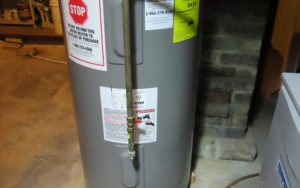Home Inspector Roseville | Home Inspection 651-666-5602

You depend on your water heater to provide you hot water at all times and be functioning as it is meant to, but sometimes when we don’t think about how a water heater can break down over time or fail can leave us with cold water and unexpected cost down the road. If you are buying a home or currently own a home, we recommend a water heater inspection be conducted before buying or performed annually on your home.
Our home inspector will come out to your home and inspect the following areas below on your water heater:
- Sediment Build-Up- A foul odor similar to rotten eggs is an indication of excessive sediment at the bottom of the tank. Since sediment takes up space, it can reduce the volume of water the tank will hold. It also makes the unit work overtime to heat the water, which results in higher utility bills. Most sediment issues can be resolved by draining and flushing the tank. If the sediment isn’t flushed from the tank periodically, the heater will eventually be seriously damaged.
- Noise- Another sign of sediment build-up within the tank is a popping sound that results from small pockets of air trapped in the sediment. The popping noise is created when the water is overheated, which disturbs the layer of sediment as the air bubbles rise. Noise also results when the internal burner or heating element overheats and causes the sediment to burn.

- No Hot Water- In gas-fired water heaters, this can be something as simple as a pilot light that’s gone out. It can also be due to a failing thermocouple, which is a safety device attached to the pilot light. A blocked vent can also cause the pilot light to go out, since the oxygen supply needed for combustion is cut off. When electric heaters don’t produce hot water, it’s usually a sign that the heating element, which is sometimes called an immersion heater, is faulty.
- Leakage- Water accumulating beneath a water heater usually comes from one of the three following sources:
- Condensation. Puddles under a water heater may appear to be leaks, but that’s not always the case. In some situations, the presence of water beneath the unit may be due to condensation, which the inspector needs to rule out before citing a water heater leak in the inspection report.
- Valves. Water can also leak from the tank’s cold water inlet valve, drain valve and T&P (temperature and pressure) valve.
- Corroded Tank. After eliminating condensation and leaky valves as the source of the water, it’s likely that the tank itself is leaking, which means the heater needs replacing as soon as possible. If there are visible signs of rust or corrosion on the bottom of the tank, it’s an indication that the tank’s inner lining is deteriorating and can burst, spill its contents and flood the surrounding area.
- Tripped Circuit Breaker- An electric water heater that continually trips the circuit breaker can be extremely dangerous. It means the heater is drawing too much power, which overloads the circuit and trips the breaker. The cause can be from a bad heating element, broken thermostat or faulty wiring.
Our home inspector will generate a detailed and thorough report of their findings along with pictures and will be available to the customer 24 hours after the inspection. Don’t let your water heater leaving you cold and taking more money out of your pocket, give us a call today to schedule your water heater inspection!
Home Inspector Roseville | Home Inspection 651-666-5602